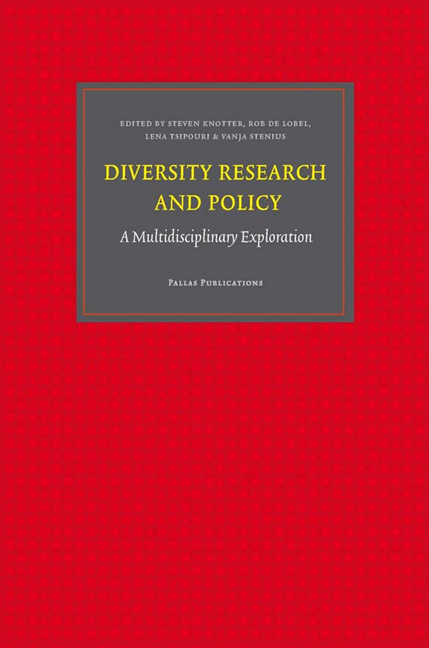Book contents
- Frontmatter
- Contents
- Acknowledgements
- 1 An Introduction
- 2 Diversity and Social Anthropology
- 3 Diversity and Sociology
- 4 Diversity and Criminology
- 5 Diversity and Ecology/Ecological Economics
- 6 Linguistic Diversity
- 7 Diversity and Architecture
- 8 Diversity and Urban Planning
- 9 Diversity and Economics
- 10 Diversity and Diversity Management in Business and Organisation Studies
- 11 Diversity and (Organisational) Psychology
- 12 Diversity and Law
- 13 Diversity and Public Policy
- 14 Conclusion
- About the Authors
- About the Reviewers
10 - Diversity and Diversity Management in Business and Organisation Studies
Published online by Cambridge University Press: 15 January 2021
- Frontmatter
- Contents
- Acknowledgements
- 1 An Introduction
- 2 Diversity and Social Anthropology
- 3 Diversity and Sociology
- 4 Diversity and Criminology
- 5 Diversity and Ecology/Ecological Economics
- 6 Linguistic Diversity
- 7 Diversity and Architecture
- 8 Diversity and Urban Planning
- 9 Diversity and Economics
- 10 Diversity and Diversity Management in Business and Organisation Studies
- 11 Diversity and (Organisational) Psychology
- 12 Diversity and Law
- 13 Diversity and Public Policy
- 14 Conclusion
- About the Authors
- About the Reviewers
Summary
A Brief Description of the Discipline of Business and Organisation Studies
Organisation studies deal with organisations, organising, and people who are subject to being organised. The discipline focuses on organisations as an object of study; this includes their specific structures, the ways in which they are managed and the actors within them (Hodge, Anthony & Gales 2003). As a field, organisation studies have their roots in the second half of the nineteenth century, when large-scale organisational entities started to spread in Western societies. The early writings tended to celebrate organisations as the instruments that would once and for all ensure material progress, reconciling collective and individual needs (March & Simon 1958). Today organisation studies is characterised by a wide array of voices, perspectives and disciplines (e.g., sociology, business, management, psychology, and philosophy) debating the nature of organisations and the assumptions underlying their study (Burrell & Morgan 1979, Deetz 1996, Fleetwood 2005, Reed 2006). Management studies is a sub-discipline of organisation studies dealing specifically with the way organisations are (or should be) managed in order to achieve their goals. The term ‘management’ has its roots in the Italian word ‘maneggiare’, which means “to handle a horse”. This etymology reveals its action- and goal-oriented connotation, involving taking responsibility for, and control of, someone or something else (Alvesson & Willmott 1996).
The Meaning and Categorisation of Diversity in Organisation and Management Studies
Despite its relatively recent introduction in organisation studies, diversity has become a popular topic among Western managers, practitioners and scholars over the last fifteen years (Maxwell, Blair & McDougall 2001, Nkomo & Cox 1996, Nkomo & Stewart 2006, Prasad & Mills 1997). The term generally refers to differences in people's identities “based on membership in social and demographic groups” (Nkomo & Cox 1996: 339) such as ethnicity, gender, race, sexual orientation and physical ability. However, diversity can also be understood more broadly, including dimensions such as lifestyle, educational background, work experience, cognitive style, and even personality (Nkomo & Cox 1996, Prasad, Pringle & Konrad 2006, Zanoni & Janssens 2004, see also Bechtoldt in this volume). Diversity management and managing diversity refer to programmes and actions that organisations set up to recruit, retain and manage diverse employees and to create a context in which everybody can perform and contribute to the organisation (Litvin 2002, Mavin & Girling 2000, Prasad & Mills 1997).
- Type
- Chapter
- Information
- Diversity Research and PolicyA Multidisciplinary Exploration, pp. 159 - 180Publisher: Amsterdam University PressPrint publication year: 2012



